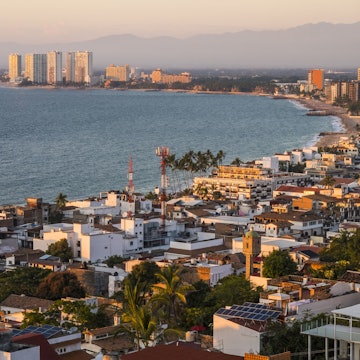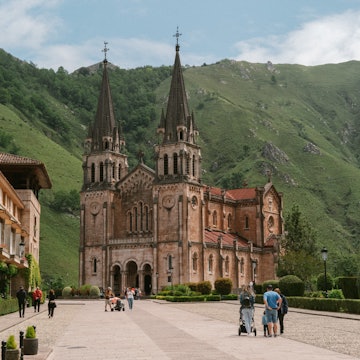
9 modern architectural marvels worth traveling for



Savvy travelers will want to visit each of these standout structures – including the National Stadium in Beijing © Ljupco Smokovski / Shutterstock
All built within the last 150 years, these stunning buildings around the world are monuments that will stand the test of time.
From the Taj Mahal and the Leaning Tower of Pisa to the Empire State Building and the Eiffel Tower, architectural landmarks form some of travelers’ most indelible memories.
Indeed, buildings are endlessly intriguing: as aesthetic objects, as reflections of their time, as cultural artifacts, as emblems of human endeavor and – yes – as backdrops for memorable photos to post to social media. As we started thinking about the works of architecture worthy of their own trip, we found ourselves focused less on iconic sites like Petra, the Giza Pyramids, Notre Dame and the temples of Kyoto, and more on structures of a more recent vintage.
Below, you’ll find a selection of buildings – some well known, some more off the beaten track, all begun within the last 150 years – that we think will stand the test of time.
Here is a list of nine modern architectural marvels to plan a trip around.

1. Kimbell Art Museum, Fort Worth, Texas, USA
Architect: Louis Kahn
Year completed: 1972
The staggering collection of old masters contained within this small museum’s walls – including famous works by Caravaggio, Michelangelo, Velázquez and Cézanne – is alone worth the trip to Fort Worth. But so is the austere and surprisingly moving building that contains them. With its barrel vaults, porticos and elegant landscaping, the building – by the famous modernist Louis Kahn, a veritable poet of poured concrete – takes inspiration from the architecture of ancient Rome. Yet the building’s smooth finishes, free of ornament and awash with light thanks to ingeniously engineered skylights, let the art take center stage. The result is an architectural masterpiece that recedes, hiding in plain sight.
Planning tip: Make a (full) museum day of it by visiting the Museum of Modern Art across the street. Its large-format galleries of works by the Abstract Expressionists and contemporary creators form a lovely counterpart to the Kimbell’s works, which reward close inspection.
Plan your trip to Texas with our picks for the best things to do

2. Sydney Opera House, Sydney, Australia
Architect: Jørn Utzon
Year completed: 1973
The jewel of Sydney’s skyline and one of the greatest works of 20th-century architecture, the Sydney Opera House enjoys a plum setting on a peninsula facing Sydney Harbor. The iconic structure consists of a series of eight sail-like roofs that were highly technical to engineer. (This difficulty caused a falling-out between Danish architect Jørn Utzon and his client, with another architect brought in to finish the job. Innovation ain’t easy.) Like flower petals fanning out over the building, the roofs are made of more than a million concrete roof tiles held in place by 217 miles of tensioned steel cables
Planning tip: Performance spaces anchor each interior space – but even if you don’t go for a show, the complex’s bars and lounges offer stellar views out over the harbor.
The ultimate guide to Sydney with kids

3. La Sagrada Família, Barcelona, Spain
Architect: Antoni Gaudí
Year completed: ongoing (begun 1882)
Surely one of the most ambitious and dramatic buildings of all time, Barcelona’s Temple of the Holy Family, the culmination of the singular vision of Catalan architect Antoni Gaudí, remains unfinished almost 100 years after his death – which only adds to its aura of significance. An incredible 140 years after the laying of its cornerstone, construction continues today on the monument, which is both a functioning church and one of Barcelona’s marquee attractions.
Inspired by nature and resembling a surreal sandcastle, Gaudí’s design included 12,350ft- (3764m-)high towers decorated with colorful mosaics and filled with bells ringing through their hollow cores; three grand facades; and a giant nave constructed without the need for flying buttresses. Today, as the church nears completion, Gaudí’s dreamy, somewhat weird and truly singular vision continues to inspire visitors from around the world.
Escape the crowds in these fabulous Barcelona neighborhoods

4. Louvre Abu Dhabi, Abu Dhabi, United Arab Emirates
Architect: Jean Nouvel
Year completed: 2017
Perhaps the most prominent symbol of Abu Dhabi’s claim to be Dubai’s wiser, more sophisticated sibling, this museum has become a major draw for international visitors. Artworks – some on loan from its namesake in Paris and other French museums – are on display in thematically organized galleries, letting viewers compare and contrast pieces from across cultures and continents under one roof.
And this roof is truly one of a kind. French architect Jean Nouvel covered the white cubes that house the galleries with a massive steel dome (monumental, really: it weighs 7000 tons) whose latticed patterns evoke the geometries of Islamic art. The thrilling result is a kaleidoscope of patterns as you navigate the museum, a “rain of light” that turns the museum itself into an ever-changing work of art.
Planning tip: Located on Saadiyat Island, the Louvre Abu Dhabi juts out into the Persian Gulf. Arrive by water taxi from Marsa Mina to admire how the complex practically shimmers against the blue water.
Here’s all you need to know before your visit to Abu Dhabi

5. Alára Concept Store, Lagos, Nigeria
Architect: David Adjaye
Year completed: 2015
This gorgeous store conveys the vibrance and influence of Lagos’ style scene. Alára brings together the designs of contemporary African designers with those such storied fashion and lifestyle brands as Comme des Garçons and Saint Laurent – a creative curation that has made the retailer a true trendsetter in Africa. To fulfill its grand ambitions, the company turned to one of contemporary architecture’s brightest stars: Ghanaian-British architect David Adjaye, whose other notable projects include Abu Dhabi’s Abrahamic Family House and the National Museum of African American History & Culture in Washington, DC. Inside Adjaye’s cube of red-pigmented concrete, a soaring atrium encloses retail display spaces, as well as a continuous staircase on which you might sit down and start a conversation. Translucent screens and geometric details nod at African motifs, marking this outpost of global luxury as truly of its place.
Lagos is an often maddening and always thrilling city. Here’s what you need to know before you visit

6. Fallingwater, Mill Run, Pennsylvania, USA
Architect: Frank Lloyd Wright
Built: 1939
Like an exquisite Jenga set, this iconic house consists of a series of cantilevered terraces that jut out over the bucolic Bear Run waterway in the woods of western Pennsylvania. The epitome of the vision of American master architect Frank Lloyd Wright, Fallingwater seems to emerge from its beautiful site – even as its angular edges hardly blend in. This merger of the natural and the man-made make it a place of pilgrimage for those who know that modern architecture can stir the soul.
Planning tip: Fallingwater’s rural setting is integral to its appeal; the closest major city is Pittsburgh, a 75-minute drive away. Make a weekend of it and discover the art scene of this former industrial powerhouse, including the Mattress Factory and the Andy Warhol Museum (the Pop maestro was born in town).
Want to explore even more Pennsylvania? Consider these road trips in the Poconos

7. Cuadro San Cristobal, Mexico City, Mexico
Architect: Luis Barragán
Year completed: 1969
Mexican master Luis Barragán is a cult favorite among architecture buffs – and while we highly recommend visiting his former home and studio as well as Casa Gilardi in central Mexico City, for our money the best example of his fusion of modernism and Mexican traditions is Cuadro San Cristobal, in the city’s suburbs. The project evokes a rural hacienda: a private house looks out onto a courtyard, where a sloping pool contains a pump-like waterfall and a sharply angled set of archways throw precise shadows. The austerity of the forms is offset by the exuberant pink and purple stucco that covers the exterior walls – adding a joyous Mexican flair to the complex.
Planning tip: Cuadro San Cristobal is still a private home, so access is strictly controlled. Currently, only the architectural tour guides of The Traveling Beetle can get you access through a half-day tour (in a vintage Volkswagen bus). The excursion is pricey – and Barragán is worth it.
Mexico City is a big place. Here’s how to get around town

8. Chapelle de Notre-Dame du Haut, Ronchamp, France
Architect: Le Corbusier
Year completed: 1955
Ironically for a nonbeliever, one of modernist architect Le Corbusier’s greatest legacies may be his brilliant design for a small church: the Chapelle de Notre-Dame du Haut. Replacing a chapel that had drawn pilgrims for centuries before its destruction during World War II, the Swiss architect created a lyrical, soaring building from the typically unforgiving medium of concrete. The chapel’s funnel shape channels attention towards the altar, while an ethereal vertical volume draws eyes and minds to the heavens. The scattered painted windows allow colorful light to stream through the chapel, adding even more depth to the faithful’s contemplation. Le Corbusier also gave the building – which is set on a hilltop overlooking four mountain peaks – a purposeful exterior form to allow distinct areas for outdoor services and events during times of pilgrimages.
This is our list of the absolute must-do experiences in France

9. National Stadium, Beijing, China
Architect: Herzog & de Meuron
Year completed: 2008
There’s no more iconic example of China’s ambitions than the National Stadium, affectionately known as the Bird’s Nest, the site of both the 2008 Beijing Olympics and 2022 Winter Olympics. Designed in collaboration with dissident Chinese artist Ai Weiwei, the stadium’s circular shape was inspired by traditional ceramics, then wrapped in a latticework of twisted steel that glows spectacularly at night.
Get out and about without spending a single yuan: Beijing’s top free things to do













